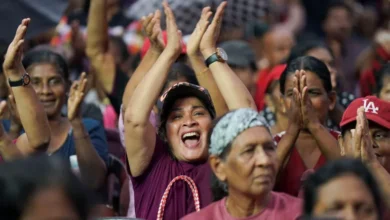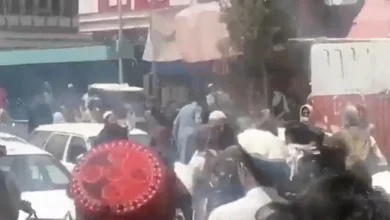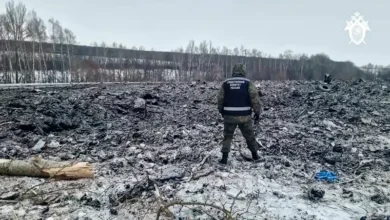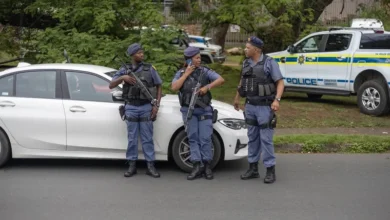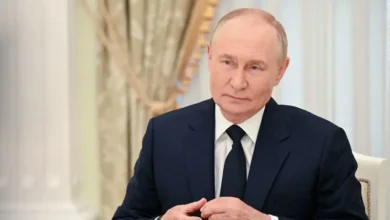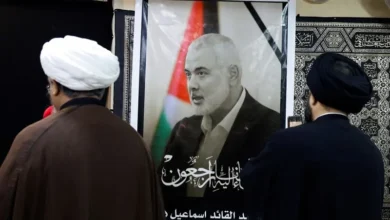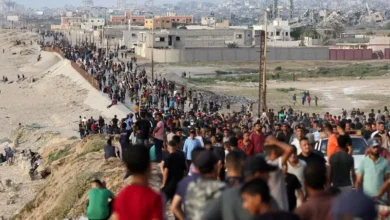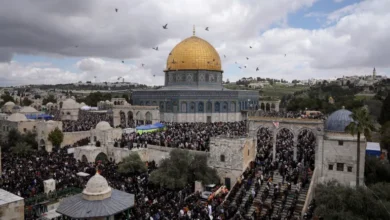Attacks on Rafah intensify despite condemnation
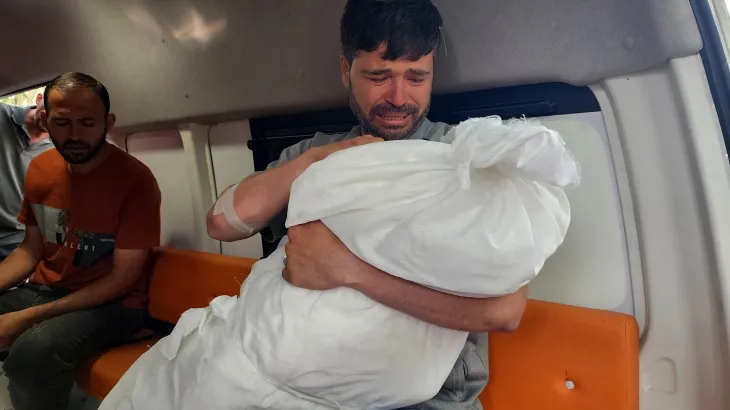
- Israeli forces shelled a tent camp in a designated “safe zone” west of Rafah and killed at least 21 people, including 13 women and girls, in the latest mass killing of Palestinian civilians.
- The UN Security Council convened an emergency meeting over Israel’s ground invasion of Rafah as Spain, Ireland and Norway formally recognised the state of Palestine.
Qatari emir, Greek president discuss Gaza war
Qatar’s Emir Sheikh Tamim bin Hamad Al Thani, on his first official visit to Athens, has discussed the war in Gaza with Greek President Katerina Sakellaropoulou, according to a Qatari government release.
Speaking to Greek media, Qatar’s ambassador to the country, Ali al-Mansouri, highlighted the visit’s importance in strengthening Qatari-Greek ties and underlined Qatar’s efforts to secure a ceasefire and bring more humanitarian aid into Gaza.
Qatar has been a key mediator in ceasefire talks between Israel and Hamas.
15 killed today in Rafah
Israeli air raids and artillery shelling have killed at least 15 Palestinians since this morning, our colleagues on the ground are reporting.
In one video shared on social media, verified by Al Jazeera’s Sanad fact-checking agency, smoke can be seen rising from a blown-out residential unit in a Rafah building. Other footage seen by Al Jazeera shows Palestinians injured from quadcopter attacks in Rafah’s Tal as-Sultan area.
The continuing attacks have pushed more Palestinians in western Rafah to flee towards Khan Younis.
If you’re just joining us
These are the main developments from today:
- Prime Minister Benjamin Netanyahu’s national security adviser, Tzachi Hanegbi, says that he expects fighting in Gaza to continue throughout 2024 at least.
- Our colleagues at Al Jazeera Arabic report that Israeli attacks to the west of Deir el-Balah have killed at least one Palestinian and injured others.
- Spanish Prime Minister Pedro Sanchez has met with his Palestinian counterpart and leading officials from several Middle Eastern countries in Madrid following Spain, Ireland and Norway’s formal recognition of a Palestinian state.
- Turkey’s President Recep Tayyip Erdogan unleashed criticism towards Western leaders over their “silence” on the Gaza war, accusing them of being complicit in Israel’s “barbarism”.
- Iran’s Tasnim News Agency reports that Tehran has provided Yemen’s Houthis with Ghadr, a type of sea-launched medium-range ballistic missile.
- The Israeli military says three of its soldiers serving in the Nahal Brigade have been killed in the south of the Gaza Strip.
- There were confrontations between Palestinian fighters and Israeli forces in the town of Tammun, about five kilometres (three miles) south of Tubas city in the occupied West Bank this morning.
Scabies spreading among Palestinian prisoners
Contagious skin diseases are rapidly spreading among Palestinians in Israeli jails, with dozens of cases seen recently by lawyers and released detainees, reports the Palestinian Prisoners Society.
The most prevalent of the diseases is scabies, it says, a highly contagious infestation caused by small ticks. Its spread is worsened by poor hygiene conditions, overcrowding and limited water in Israel’s jails, according to the group, specifically the facilities in Israel’s Negev desert and Megiddo.
The group claims Israel is leaving infected prisoners without treatment and even transferring them to other areas of the prison where the disease can spread, acts that it says amount to “medical crimes”.
Israeli brigade simulates taking over targets in Lebanon
The Israeli military says its Golani Brigade, an infantry brigade formed in 1948, has completed exercises that “improved the brigade’s readiness for a northern combat scenario”.
It said the brigade’s soldiers “trained on taking over targets along the terrain routes simulating Lebanon”.
Hezbollah in Lebanon and the Israeli military have traded fire since October 8, when the Lebanese armed group launched an attack in solidarity with Palestinians in Gaza.
In recent months, the severity and frequency of these cross-border attacks have increased. Coupled with an escalation in tensions between Iran and Israel this has led to heightened fears of greater regional conflagration.
Former US ambassador Nikki Haley meets with Israel’s Gallant, Gantz
Haley, a former US envoy to the UN and failed presidential candidate, has met with two key Israeli cabinet officials during her trip to Israel.
Hosted by Israeli Defense Minister Gallant, Haley affirmed the importance of US-Israel ties to counter their common foe – Iran, said Gallant in a post on X.
In a separate meeting with Benny Gantz, Haley discussed Israel’s “right to fight wherever necessary to remove the Hamas threat”, reported The Times of Israel, citing Gantz’s office.
Earlier in her Israel trip, Haley, accompanied by Israeli parliament member Danny Danon, was photographed writing “Finish them” on an Israeli shell as she toured military locations on Israel’s northern border with Lebanon.
No indication that Rafah crossing could open soon: Palestinian official
The Palestinian health minister says there has been no indication from Israel that the Rafah crossing, used to bring in essential humanitarian and medical supplies to the Gaza Strip, could be opened soon.
“Since it was closed, we have no indication that the Israelis would like it to be opened any time soon,” Majed Abu Ramadan told reporters on the sidelines of the World Health Assembly in Geneva.
Rafah was a major entry point for humanitarian relief before Israel seized control of the crossing from the Palestinian side earlier this month.
-
What is the Philadelphi Corridor?
We have just reported that Israel claims to be in control of 75 percent of the Philadelphi Corridor.
Here is some more information about the key buffer zone:
- The Philadelphi Corridor, also known as the Philadelphi Route, is the 14km (8.7 miles) long strip of land representing the entire border area between Gaza and Egypt.
- It was established as a buffer zone controlled and patrolled by Israeli armed forces as part of the 1979 peace treaty with Egypt.
- Its stated purpose was to stop weapons and material from reaching the hands of Palestinians inside the Gaza Strip, which Israel occupied, and to prevent people from moving between the Palestinian lands and Egypt without tough checks.
- An agreement after the Israeli disengagement from the area in 2005 allowed Egypt to safeguard the Egyptian side of the corridor, with the Palestinian Authority responsible for the other side.
- But Hamas was in full control of the enclave some two years after the Israeli withdrawal.
- Israel wants full control of the border area, supposedly to ensure its security. But this would amount to a de facto full reoccupation of the Gaza Strip, something Israel and the United States have publicly disagreed over.
-
